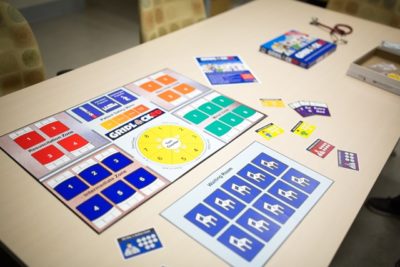By James Scarfone
Move over, Catan and Monopoly. There’s a new player in the board game world that is fun for the whole (medical) family.
GridlockED is a serious game (i.e. simulation-based game) that helps doctors prepare for work in the hospital’s emergency department (ED). A group of Hamilton Health Sciences (HHS) emergency physicians and McMaster University students created it as part of their academic research.
The game is intended to be a safe way for doctors to learn how to manage multiple patients in a busy, simulated ED before they experience those challenging real-life scenarios. Players plan strategies as a group to admit, treat and release patients while minimizing threats to patient safety.
Dr. Teresa Chan and her colleagues developed GridlockED as a way to teach medical students and residents how to manage multiple patients with various degrees of illness or trauma in a low-risk environment.
“GridlockED started as a conversation over coffee between friends one afternoon,” said Dr. Chan, co-creator of the board game and an emergency physician at HHS. “I became so obsessed with the idea that I went home that day to doodle some designs. One thing led to another and we started development just a few months later.”
Two emergency doctors instruct their colleagues how to play a board game
The object of the game
Like many strategy board games, the game takes a few minutes to set up using multiple players. To win the game you must treat as many patients as possible within an eight-hour shift. Players work together to use their action points to fulfill care for every patient they look after.
Players review patient cards with different ailments and conditions listed on them, and actions are distributed between the various types of medical and nursing providers. It reveals the complexities of collaborative, inter-professional care.
Prioritizing each patient based on availability of doctors, nurses and specialists is key to the game.

Dr. Alim Pardhan, a co-creator of GridlockED, provided some statistics early in the development stage that helped kick-start the execution of the idea.
“I thought this was a great idea to help our learner physicians navigate the challenging world of the ED,” said Dr. Pardhan, ED site lead at HHS. “I offered some data based on the different levels of acuity and presenting problems we experience in our hospitals.”
Dr. Pardhan hopes the game will improve the learner experience for those wishing to work in emergency medicine.
The creators previewed the game at various sites across North America. Many members of the medical community praise the game for its realistic portrayal of life in the ED.
Global interest for GridlockED
Since they announced the availability of the board game earlier this month, the creators garnered interest from around the world with many requests to own a copy.
“In just under a month, we’ve had inquiries from Australia, Africa, Europe, Asia, South America and North America.” said Dr. Chan, who is also an assistant professor of medicine at McMaster. “Basically, there has been interest everywhere except Antarctica. We couldn’t be more thrilled with the response.”
Interest was so high during the early release stages, the GridlockED team decided to move up their launch date by several months. It is for sale for US$89.99 (plus shipping). All proceeds have been generously donated by the developers to help fund future emergency medicine research.
Beyond learner physicians, the team wants to promote the game in the broader healthcare community as a way to increase knowledge on how hospital EDs work. Soon, they also plan to develop a version for the general public.
You can visit gridlockedgame.com to learn more or to purchase the game online.
James Scarfone is a Public Relations Specialist at Hamilton Health Sciences.




